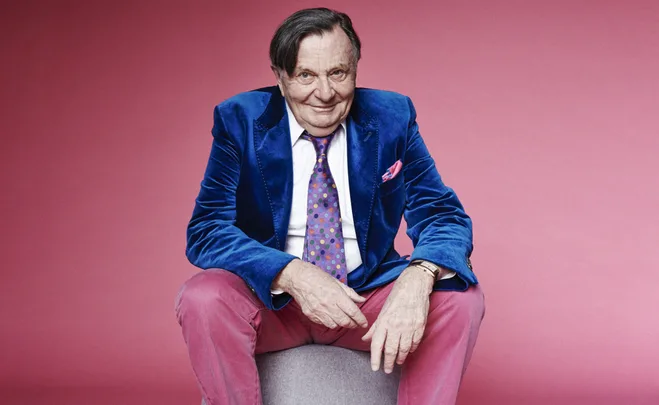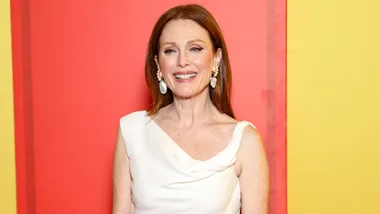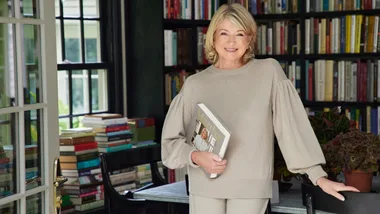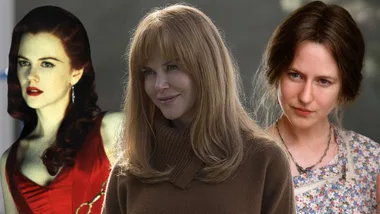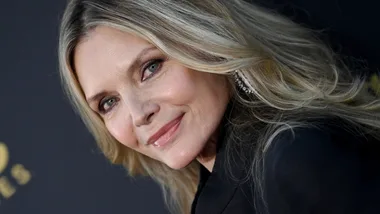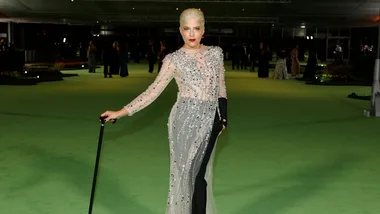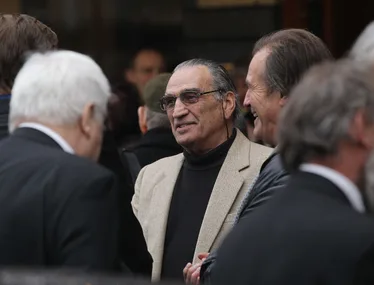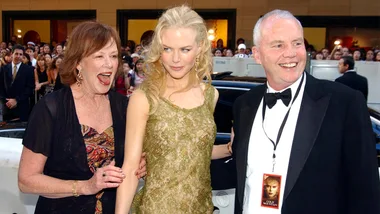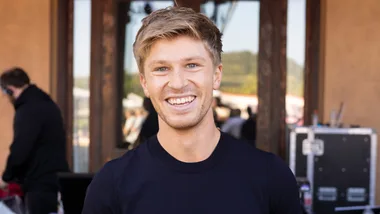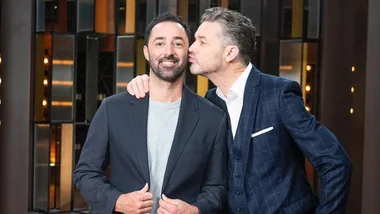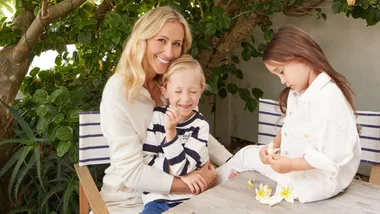The women of Australia are flying our Hills Hoists at half-mast. Why? Because we have lost our most formidable ally; an icon who spoke up for us for 70 years.
We sympathised when her son, Kenny, came out as a “practising homo” … as in homoeopath. We empathised when her daughter Valmai’s supermarket shoplifting brought shame on the family: “I mean, couldn’t it have been Harrods?”.
We’ve even shared a few conspiratorial chuckles about her husband Norm’s silicone chip prostate. “Norm’s prostate murmur turned into a rumbling so loud it woke the neighbours. They asked me if I could keep the noise down – I said there is a knob but I’m not touching that.”
Yes, I’m talking about our cherished and most beloved megastar, Dame Edna Everage, who died on April 22, her exact age unknown (she maintained she was approaching 60 but wouldn’t say from which direction).
In a trifecta of tragedy, we also lost her cultural attaché, vulgarian Sir Les Patterson, and their joint manager, the wise, warm and witty intellectual, Barry Humphries.
But it’s Edna we women will miss the most, because she was so firmly on our side.
Australia is home to the world’s most deadly creatures – the tiger snake, the funnel-web spider, the box jellyfish – and Dame Edna Everage. Edna’s wit was venomous. It was extremely hazardous to be dragged up on stage as you might be devoured alive.
She was the [tennis champ Martina] Navratilova of the back-handed compliment, able to elevate and annihilate in the same breath, especially when it came to puncturing the male ego. Talking to Michael Bolton on his chat show, she purred, “You’ve had nine hits this year,” then just as the singer was preening himself, added caustically, “… on your website.”
And it’s that mix of toughness and humour which we Aussie women so admire in Dame Edna, who often observed that she was “born with a priceless gift, the ability to laugh at the misfortune of others.”
I suspect we Aussie gals also held Edna in such high esteem because she epitomised what we like best about ourselves – she was feisty, funny and frank. Edna called a spade a spade and never a “wooden handled digging implement”. The Dame shot from the lip, providing us with much satirical ammunition for our own tongue-lashings.
As well as her black belt in tongue-fu, Edna also evolved along with us, from housecoats to haute couture. She was a “pioneer of Thai silk” and in the late ’70s even showcased the denim tennis outfit. By the ’80s she’d finally become a full-on fashion icon.
But it was Edna’s manager I knew best. I first met her alter ego, Barry Humphries, in my late teens at the Melbourne comedy awards, where I confessed that I felt he may have invented me.
“Dame Edna has a daughter named Valmai and she married Mervyn and they moved to a blonde-brick veneer in the suburbs … My mum’s name is Valmai and she married Mervyn and they built a blonde-brick house in suburbia. So, am I just a figment of your imagination?” Barry laughed, before going into Dame Edna mode – “How spooky, possum!”
But from that moment on, our friendship was forged. For us, it was love at first slight and we’ve been tripling entendres ever since. A dinner party involving Barry invariably became the Wimbledon of wit, with banter being lobbed back and forth at such speed guests were left reeling from quip-lash.
When I moved to London, it was to Barry’s neighbourhood. Our homes backed onto each other. Whenever he got back from some trip or other, he’d email me – “Kathy dear, I’m poised at your rear entrance” or something equally mischievous.
Sitting in my garden one summer’s day, nibbling Anzac biscuits, I asked whether knowing Edna so intimately for all these years had made him more sympathetic to the female psyche?
Topping up my tea, Barry revealed that Dame Edna didn’t want Les in the show. “Most women wake up next to a Les on their pillow every morning and Edna feels sure that they don’t want to spend an evening with him as well. I think women find Dame Edna empowering because she’s saying there’s a way out,” he elaborated. “You can tiptoe through the broken kids’ toys in the backyard and escape over the fence to a new life!”
This is a sentiment which would not have gone down well with Barry’s own mother, a beacon of suburban respectability, who was disapproving and aloof. I asked Barry if Edna reminded him of his mum?
“Actually, my mother was very amusing in an extremely sardonic way. But Edna is much brighter. When she’s performing, I feel like I’m watching from the wings. When she says something clever, I often think ‘I wish I’d said that!’ … Women are so much more broad-minded than men,” he expounded. “They have a much more important role than men too. And are just much, much more interesting.”
Many of Barry’s closest friends were female, including Emily Perry, the real person behind Edna’s long-suffering bridesmaid, Madge Allsop. Barry paid for her retirement home and showered her with kindness and affection until she died at the grand old age of 100 in 2008.
As much as I adored seeing Barry in his natural environment – up on stage making audiences laugh so hard I worried they’d be hospitalised from hilarity – I always looked forward to the end of each tour, when I got Barry back all to myself.
Sometimes we would pop off to see an art exhibition. Our most recent excursion was to a King’s Cross warehouse to see Damien Hirst’s latest esoteric pieces. “If we stand still for long enough, some rich punter might think we’re one of Damien’s art installations and buy us,” I whispered. Barry tittered. “Our title? ‘Mixed Media. Two Slightly Used Larrikins,'” he teased.
Other times we’d nip to the theatre. If the acting wasn’t very good we’d spend the interval concocting euphemistic compliments to utilise in the star’s dressing room afterwards. “How about you!” or “You’ve done it again!”
In the summer we’d saunter to a local restaurant for lunch, bemused by the cheers rising up from Lord’s Cricket Ground. “I’m sorry to say that I haven’t watched cricket since 1948 and I doubt that it has become interesting in the meantime,” Barry mused. I concurred. “Yes. I’ve had marriages that have lasted less time than a test match!”
Last year, when news filtered through the restaurant to us that the Aussies were winning, he quipped, “Forget those long queues at the chemist to buy a COVID RAT Test. How do you get a rapid test? Play the Poms.”
On rainy days he’d show me through some of the treasures in his library, consisting of 50,000 books. It was the intellectual version of Aladdin’s cave. Whereas Les Patterson thought ‘erudite’ was some kind of glue, Barry collected rare books, including his beloved volumes of surrealist poetry, and exquisite paintings.
As a young man, he once mortgaged his flat in order to buy a painting he adored, with no obvious means of paying off the debt. Flicking through dictionaries, we’d choose our favourite words. “Isn’t ‘aplomb’ just the best word?”. “Yes,” I agreed, “it feels like a lip massage even just saying it.” And with great aplomb, he generously gave me cover quotes for my novels and launched them too.
“I hope this one contains a little light material,” he once joshed sarcastically. “You would really baffle critics with a work of Lette-erature. Think about it, dear one.” He emailed me recently with these kind words: “You know that I once called you ‘the best and bawdiest authoress since Aphra Behn. (Q.V.)’.”
I told him that once I’d worked out what that sentence meant, I’d get back to him.
Because, you see, despite the fact that I left school at 16 (the only examination I’ve ever passed is my Pap smear test) Barry never made me feel inferior. There was nothing elitist about him, which is why our homegrown comic icon is equally revered by Tamworth tow truck drivers and Mayfair toffs.
“It was Kerry Packer’s brother, Clyde, who informed me that I needed to play in Leagues Clubs,” Barry once recounted. “He told me to land at Sydney’s Mascot airport and go in the wrong direction – not to the city but to the suburbs. Then you’ll meet the real people. But,” he ruminated over dessert one day, “Edna quickly developed amazing cultural power. Everything Edna liked, people banished,” he explained. “I got so many angry letters from florists: ‘Thanks to you, nobody is buying gladies any more,’ they’d complain.”
Barry then went on to tell me how Harry Seidler, the famous architect, was furious because Edna liked his Sydney Blues Point Tower block.
“But all Edna did was to praise!” Barry said, raising an impishly mocking brow. “I was once invited to dinner after a show by some nice Adelaidians,” he continued. “Anyway, the food was lovely, the people were really nice … The only unusual things were the rectangular shapes on the walls where the pictures used to be. When it was time to go, l started looking for my coat. It wasn’t in the hall so I opened the cupboard door and out came an avalanche of Pro Hart paintings … A Hart bypass,” he punned, laughing.
“You see, Edna had commented in the show on how much she liked Pro Hart’s work … and they’d rushed home to hide them. But I felt quite upset that people thought I was sneering and snobby.”
In truth, Barry saved his harshest criticisms for himself. “Don’t come to the show with high expectations. I’m even embarrassed you’re coming!” he emailed me last year before I set off to see his one-man show, The Man Behind the Mask. “This is one of those long-ago ‘yeses’ that should have been ‘sorry but I have to be in Australia helping my parents fight a bushfire.’ Or, ‘my granny has been partially eaten by a shark’.”
But of course, the show was a breathtakingly brilliant tour de farce, as usual. Barry Humphries was that very rare breed indeed: a self-made man who didn’t worship his creator.
Our friendship proved a lifeline for us both during two years of pandemic lockdowns when we’d meet for a gossip and a giggle on a socially distanced stroll through our neighbourhood. “Social distancing is nothing new,” Barry told me mid-promenade through the eerily empty streets. “I practised it often, early in my career, when my surrealist expressionism made audiences evaporate.”
The long lockdowns were particularly gruelling for performers. Audience Deficiency Disorder (A.D.D.) hit Barry hard. Relief came only once a week when we’d emerge, blinking, from our various suburban burrows to clap for the carers.
Clad in his smoking jacket, Barry would sashay onto his top-floor balcony, unseen by passers-by, applaud our heroic frontline workers, then take a moment to secretly transport himself back to the theatre. Eyes atwinkle, he would then bathe in the applause and blow a few kisses before taking a humble bow.
As I gaze across our gardens toward his library, I still can’t believe the great comic legend has taken his final curtain call. Comic genius, satirist, poet, painter, linguist, intellectual, novelist, lyricist, musician, thespian – the man was blessed with a minestrone of talent. But his greatest gift was for friendship.
I will miss his wicked grin, mischievous eyes, wry, dry humour and deliciously self-deprecating company for the rest of my life.For once, there will be no encore from our beloved showman extraordinaire. But in Dame Edna and Sir Les, Barry has left us with the most precious gift – a legacy of laughter.
